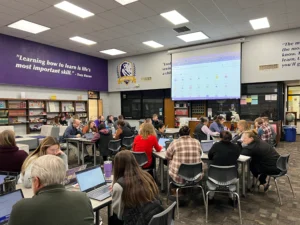There is clearly a lot of angst surrounding AI in education at the moment. Many folks are excited, but just as many are nervous. As one English teacher put it in our Short Answer Teacher Community recently, “It’s all moving SO fast. I’m having a hard time keeping up!” New tools seem to come out every day, each one more potentially disruptive than the last, and it can be unclear where to turn to for guidance on best practices. It’s ironic, then, that one place to turn might be…AI itself.
The Learning Agency recently trained its own AI Chatbot using data from the Doing What Works (DWW) Library, a collection of practical educational research insights developed by the U.S. Department of Education’s What Works Clearinghouse for the purposes of helping educators make better, research-informed decisions (*Note – The Learning Agency is a supporter of Short Answer through their Learning Tools Competition). Their AI chatbot is trained on the DWW Library and is designed to provide easy access to this wealth of research-backed advice. You can read more on the development of the chatbot and the preliminary research here.
The potential benefits of the DWW chatbot for educators are significant. It could support teachers with lesson planning and offer guidance on effective classroom management strategies. For example, a teacher could copy-paste in their lesson plan into the bot, ask if its structure and/or content is learning science-backed, and ask it to make suggestions on how to tweak the lesson if not. It could help principals assess whether school policies align with evidence-based practices. It could also help administrators in the procurement process. Many tools today claim to be “supported by research”, but those claims can be hard to independently verify. A tool like the Learning Agency’s DWW chatbot could provide much more transparency.
Making research-backed practices more accessible to educators is central to our mission at Short Answer, so we’re excited to share a tool like the DWW chatbot. As the ongoing digital transformation in education continues, it is vital that we continue to ground our practice in research-backed approaches to teaching and learning.









